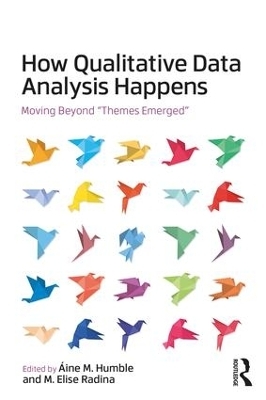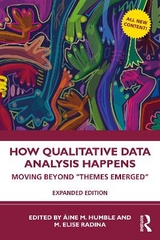
How Qualitative Data Analysis Happens
Routledge (Verlag)
978-1-138-04467-8 (ISBN)
- Lieferbar
- Versandkostenfrei
- Auch auf Rechnung
- Artikel merken
Winner of the 2020 Anselm Strauss Award for Qualitative Family Research, National Council on Family Relations.
How is qualitative data actually collected, analyzed, and accomplished? Real stories of How Qualitative Data Analysis Occurs: Moving Beyond "Themes Emerged" offers an in-depth look into how qualitative social science researchers studying family issues and dynamics approach their data analyses. It moves beyond the usual vague statement of "themes emerged from the data" to show readers how researchers actively and consciously arrive at their themes and conclusions, revealing the complexity and time involved in making sense of thousands of pages of interview data, multiple data sources, and diverse types of data.
How Qualitative Data Analysis Occurs focuses on a diversity of topics in family research across the life course. The various authors provide detailed narratives into how they analyzed their data from previous publications, and what methodologies they used, ranging from arts-based research, autoethnography, community-based participatory research, ethnography, grounded theory, to narrative analysis.
Supplemental figures, images, and screenshots which are referred to in the chapters, are included in an accompanying eResource, as well as links to the previously published work on which the chapters are based. This book is an invaluable resource for experienced and novice qualitative researchers throughout the social sciences.
Áine M. Humble is Professor in Family Studies and Gerontology at Mount Saint Vincent University, in Halifax, Nova Scotia, Canada. M. Elise Radina is Professor in Family Science and Social Work at Miami University in Oxford, Ohio, USA.
List of Tables
List of Figures
Acknowledgements
Editors
Contributors
Introduction: Real Stories of How This Volume Happened
M. Elise Radina and Áine M. Humble
Section 1: Stories
Chapter 1: Analyzing Self and Other in Autoethnography: Telling Secrets About One’s Stillborn Child
Marcus B. Weaver-Hightower
Chapter 2: Creating Research Poetry: A Nursing Home Example
Evonne Miller
Chapter 3: Applying Indigenous Analytical Approaches to Sexual Health Research: A Reflection on ᐅᓂᒃᑲᐊᖃᑎᒋᐃᓐᓂᖅ Unikkaqatigiiniq (Storytelling) and ᓴᓇᓂᖅ Sananiq (Crafting)
Gwen K. Healey
Chapter 4: Thematic and Phenomenological Analysis in Research on Intimate Relationships
Paul C. Rosenblatt and Elizabeth Wieling
Chapter 5: Sharing Expertise in Appalachia: A Collaborative Feminist Content Analysis of In-Depth Interviews with Older Women Cancer Survivors
Katherine R. Allen and Karen A. Roberto
Chapter 6: Revisiting and Remaking the Listening Guide: An Ecological and Ontological Narrativity Approach to Analyzing Fathering Narratives
Andrea Doucet
Chapter 7: Authenticity in Qualitative Data Analyses: Notes on Racial and Gender Diversity in Team Ethnography of Young Men of Color
Kevin Roy, John Hart, and Laura Golojuch
Chapter 8: What Does This Mean to You? Partnering with Amigas de la Comunidad to Analyze the Housing Conditions of Undocumented Latina Immigrants
Colleen K. Vesely, Bethany L. Letiecq, Rachael Goodman, Marlene Marquez, Liciane Alves, Wendy Lazo, and Roberto Martinez
Chapter 9: Lost in the Data: Strategies Used to Analyze a Large-Scale Collaboratively-Collected Qualitative Dataset of Low-Income Families
Katherine E. Speirs, Colleen K. Vesely, and Kevin Roy
Chapter 10: Uprooting Grounded Theory: The Messy Reality of Understanding Low-Income Couples’ Cohabitation Transitions
Tyler Jamison
Chapter 11: Charting the Course: Analytic Processes Used in a Study of Residents’ Care Networks in Assisted Living
Candace Kemp, Mary M. Ball, and Molly M. Perkins
Chapter 12: Using Family-Level Data in Research on Work-Related Travel: A Multi-Tonal Experience
Anisa Zvonkovic and Andrea Swenson
Chapter 13: An Ethnographic Analysis of Latino Gay Youth’s Paths to Homelessness
H. Daniel Castellanos
Section 2: Dialogues
Chapter 14: Dialogue about Arts-based Research
Gwen K. Healey, Evonne Miller, and Marcus B. Weaver-Hightower
Chapter 15: Dialogue about Reflexivity
Katherine R. Allen, Bethany L. Letiecq, Karen A. Roberto, Paul C. Rosenblatt, and Elizabeth Wieling
Chapter 16: Dialogue about Qualitative Data Analysis Software
Tyler Jamison, Candace Kemp, Katherine E. Speirs, Andrea Swenson, and Colleen K. Vesely
Chapter 17: Dialogue about Data Display
H. Daniel Castellanos, Mary M. Ball, and Anisa Zvonkovic
Index
| Erscheinungsdatum | 18.12.2018 |
|---|---|
| Zusatzinfo | 26 Tables, black and white |
| Verlagsort | London |
| Sprache | englisch |
| Maße | 152 x 229 mm |
| Gewicht | 385 g |
| Themenwelt | Geisteswissenschaften ► Psychologie ► Allgemeine Psychologie |
| Geisteswissenschaften ► Psychologie ► Entwicklungspsychologie | |
| ISBN-10 | 1-138-04467-9 / 1138044679 |
| ISBN-13 | 978-1-138-04467-8 / 9781138044678 |
| Zustand | Neuware |
| Haben Sie eine Frage zum Produkt? |
aus dem Bereich



